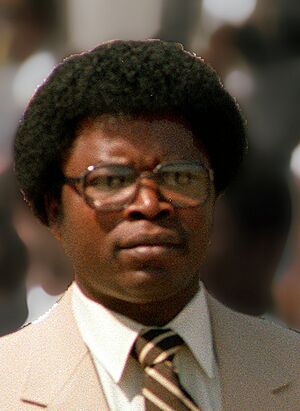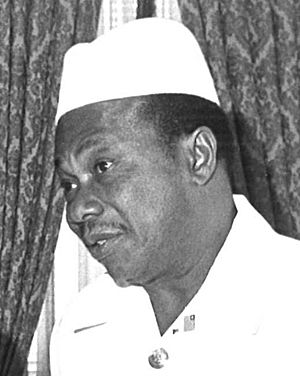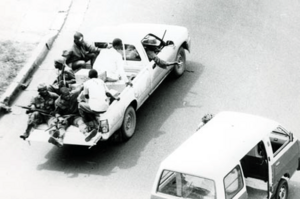Samuel Doe facts for kids
Quick facts for kids
Samuel Doe
|
|
|---|---|

Doe in 1982
|
|
| 21st President of Liberia | |
| In office 6 January 1986 – 9 September 1990 |
|
| Vice President | Harry Moniba |
| Preceded by | Himself (as Chairman of People's Redemption Council) |
| Succeeded by | Amos Sawyer (interim) |
| Chairman of the People's Redemption Council | |
| In office 12 April 1980 – 6 January 1986 |
|
| Deputy |
|
| Preceded by | William Tolbert (as President) |
| Succeeded by | Himself (as President) |
| Personal details | |
| Born | 6 May 1951 Tuzon, Liberia |
| Died | 9 September 1990 (aged 39) Monrovia, Liberia |
| Cause of death | Torture murder |
| Resting place | Body lost or destroyed |
| Political party | National Democratic Party |
| Spouses | Nancy Doe (married c. 1968–1969) |
| Children | 5 |
| Alma mater | University of Liberia |
| Occupation | Politician |
| Military service | |
| Allegiance | |
| Branch/service | Armed Forces of Liberia |
| Years of service | 1969–1985 |
| Rank | Master Sergeant |
| Battles/wars | First Liberian Civil War |
Samuel Kanyon Doe (born May 6, 1951 – died September 9, 1990) was a leader in Liberia, a country in West Africa. He became the 21st President of Liberia and ruled the country from 1980 until 1990.
Doe was a soldier in the Armed Forces of Liberia (AFL). In 1980, he led a sudden takeover, called a coup d'état. This event removed President William Tolbert and the True Whig Party from power. Doe became the first Liberian leader who was not from the Americo-Liberian group. This ended 133 years of their rule.
After the coup, Doe took charge of a temporary military government. He called it the People's Redemption Council (PRC). In 1984, he tried to make his rule seem more official. He created a new democratic constitution and held an election in 1985. He won the election, but many people said there was election fraud. Doe opened Liberia's ports to ships from other countries. This brought in money and made Liberia known as a place with low taxes. The United States supported Doe because he was against the Soviet Union during the Cold War.
Doe's time as leader was marked by strong, strict rule and corruption. He showed special favor to people from his own ethnic group, the Krahn people. This made many Liberians and even the United States unhappy with his government. In December 1989, the First Liberian Civil War began. A group led by Charles Taylor invaded Liberia to remove Doe from power. Samuel Doe was captured and killed on September 9, 1990.
Contents
Samuel Doe's Early Life
Samuel Kanyon Doe was born on May 6, 1951. His birthplace was Tuzon, a small village in Grand Gedeh County, Liberia. His family belonged to the Krahn people, an important local group.
When he was sixteen, Doe finished elementary school. He then went to a junior high school in Zwedru. Two years later, he joined the Armed Forces of Liberia. He hoped to get a scholarship for high school. Instead, he was given military duties. For the next ten years, he worked at different military places. He also went to a military school. He commanded various army posts and prisons in Monrovia. He finally finished high school through online courses. On October 11, 1979, Doe was promoted to Master sergeant. He became an administrator for the Third Battalion in Monrovia. He held this job for eleven months.
Taking Power in 1980
On April 12, 1980, Master Sergeant Samuel Doe led a military coup. He commanded a group of Krahn soldiers. They attacked the Liberian Executive Mansion. President William R. Tolbert Jr. was killed during this attack. Doe's forces also killed 26 of Tolbert's supporters. Ten days later, thirteen members of the President's cabinet were publicly killed. Soon after the coup, government ministers were paraded through Monrovia. Then, they were executed on the beach. These people were not allowed to have a lawyer or appeal their cases. Hundreds of government workers left the country, and others were put in prison.
After the coup, Doe became a general. He created the People's Redemption Council (PRC). This council included himself and 14 other low-ranking officers. They ruled the country. In the early days, many members of Tolbert's government were executed. Doe ordered the release of about 50 leaders from the opposition Progressive Alliance of Liberia. Tolbert had jailed them during earlier rice riots.
Doe then ordered the arrest of 91 officials from Tolbert's government. Within days, eleven former cabinet members, including Tolbert's brother, were put on trial. They were accused of "high treason, widespread corruption, and serious violations of human rights." Doe stopped the country's Constitution. This allowed trials to be held by a special group chosen by the new military leaders. The accused were not allowed lawyers or a jury trial. This almost guaranteed they would be found guilty.
Doe's takeover ended 133 years of Americo-Liberian political control. Some people celebrated this, seeing it as the first time native Africans ruled Liberia. Before this, the Americo-Liberian elite had mostly been in charge. Many people welcomed Doe's rule. They saw it as a change that would help the majority of the population. This group had largely been left out of government since Liberia was founded.
However, the new government, led by the coup leaders, was not ready to rule. Doe became head of state and suspended the constitution. But he promised to return to civilian rule by 1985.
In June 1981, his government announced another alleged coup attempt. Thirteen members were executed in secret. Months later, Thomas Weh Syen, a critic of Doe, was arrested. He and four other officers were promised a lawyer but did not get one. They were executed three days later. This caused fear among people in the capital city.
Samuel Doe's Presidency
During his time as leader, Doe said his actions would bring "relief to many." He started calling himself "Dr. Doe" in 1982. This was after he visited South Korea and received an honorary degree. After seven years, Doe announced in 1989 that he had finished a bachelor's degree from the University of Liberia.
Relations with the United States

In his first years, Doe openly supported the United States' foreign policy in Africa. This was during the Cold War in the 1980s. He ended diplomatic relations between Liberia and the Soviet Union.
The United States saw Liberia as an important friend during the Cold War. It helped stop the spread of Soviet influence in Africa. As their relationship grew, Doe agreed to let U.S. forces use Liberia's sea and airports. This was for the United States Rapid Deployment Forces. These forces were set up to quickly respond to threats around the world.
New Constitution and 1985 Elections
A plan for a new constitution was made in 1983. It suggested a republic with many political parties. This plan was approved by a vote in 1984. On July 26, 1984, Doe was elected President of the Interim National Assembly. He had the new constitution approved by a vote in 1984. Then, he held a presidential election on October 15, 1985.
Official numbers showed Doe won 51% of the votes. This was just enough to avoid a second round of voting. His party, the NDPL, won most seats in the Senate and House of Representatives. However, many elected opposition candidates refused to take their seats.
The election was widely believed to be unfair. Doe had the ballots taken to a secret place. Fifty of his own chosen staff counted them. International observers said the elections were fraudulent. They suggested that Jackson Doe, from the Liberian Action Party, had actually won. It was also said that Doe had more than 50 of his political opponents killed before the election. There were also claims he changed his birth year from 1951 to 1950. This was to meet the new constitution's rule that the president must be at least 35 years old. Doe was officially sworn in on January 6, 1986.
Doe publicly stated that if he lost the elections, he would not give up power. He said the army would stage another coup within two weeks. This statement was strongly criticized by other countries and the political parties in the election. Official results showed Doe won by a small margin. However, the U.S. State Department claimed there was widespread fraud.
Increased Control and Violence
General Thomas Quiwonkpa had been a leader of the 1980 coup with Doe. He tried to take power on November 12, 1985. This attempt failed after fighting in Monrovia, and Quiwonkpa was killed. Doe also announced on radio and TV that anyone found outside after a 6 p.m. curfew would be seen as a rebel and killed immediately.
Doe's government became even stricter after this failed coup. They closed newspapers and banned political activities. The government treated some ethnic groups badly, especially the Gio people and the Mano people in the north. Quiwonkpa was an ethnic Gio. This led to fighting and divisions among local groups who had lived peacefully together before.
The Civil War Begins
Charles Taylor, who used to be an ally of Doe, entered Liberia from Ivory Coast on December 24, 1989. He started a guerrilla war against Doe. Taylor had escaped from a jail in the United States. He was waiting to be sent back to Liberia on charges of stealing money. The conflict quickly grew into a full-scale civil war. By mid-1990, most of Liberia was controlled by rebel groups.
About 600 civilians were killed at a church in Monrovia on July 29, 1990. This terrible event was carried out by about 30 government soldiers loyal to Doe. The soldiers were from Doe's Krahn tribe. Most of the victims were from the Gio and Mano tribes, who supported the rebels.
Capture and Death
Doe was captured in Monrovia on September 9, 1990. He was taken by Prince Y. Johnson, a leader of a rebel group called INPFL. General Quainoo, the head of ECOMOG (a peacekeeping force), had invited Doe to a meeting. He promised Doe would be safe from the rebels.
On the morning of September 9, 1990, Doe arrived during a change in guard duty. The stronger Nigerian peacekeepers were leaving, and a weaker Gambian group was taking over. The Nigerian team had just left when Doe's group arrived. Doe was taken to General Quainoo's office. Most of Doe's aides and guards waited outside. Johnson's rebels suddenly arrived, heavily armed and uninvited. They quickly overpowered and disarmed Doe's team. They then started shooting Doe's men.
Doe heard the gunshots and asked Quainoo about it. Quainoo told him everything was fine. Quainoo then left to check outside. Johnson's men moved inside, killed Doe's remaining team, and captured him. Over 80 of Doe's men died in the event. No ECOMOG personnel were shot.
Samuel Doe's Personal Life
Samuel Doe was a Baptist. He was once a member of the First Baptist Church in Zwedru. On December 1, 1985, he changed his church membership to the Providence Baptist Church of Monrovia. Doe loved football. The Samuel Kanyon Doe Sports Complex is named after him.
Images for kids
 | Frances Mary Albrier |
 | Whitney Young |
 | Muhammad Ali |




